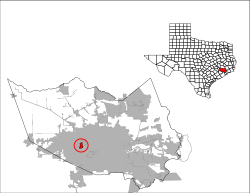Piney Point Village, Texas
| City of Piney Point Village | |
|---|---|
| City | |

A sign indicating the city limits
|
|
 Location of Piney Point Village, Texas |
|
| Coordinates: 29°45′42″N 95°30′58″W / 29.76167°N 95.51611°WCoordinates: 29°45′42″N 95°30′58″W / 29.76167°N 95.51611°W | |
| Country | United States |
| State | Texas |
| County | Harris |
| Area | |
| • Total | 2.1 sq mi (5.5 km2) |
| • Land | 2.1 sq mi (5.5 km2) |
| • Water | 0.0 sq mi (0.0 km2) |
| Elevation | 72 ft (22 m) |
| Population (2010) | |
| • Total | 3,125 |
| • Density | 1,500/sq mi (570/km2) |
| Time zone | Central (CST) (UTC-6) |
| • Summer (DST) | CDT (UTC-5) |
| FIPS code | 48-57800 |
| GNIS feature ID | 1375473 |
| Website | City of Piney Point Village |
Piney Point Village is a city in Harris County, Texas, United States. The population was 3,125 at the 2010 census. Piney Point Village is the wealthiest place in Texas. It is part of a collection of upscale residential communities in west Houston known as the Memorial Villages.
In 1885 Piney Point Village began as a station on the Texas Western Railroad. German farmers settled in the area. According to 1936 state highway maps, the community was near a sawmill.
In the mid 1950s, an effort to form a Spring Branch municipality failed. Piney Point Village incorporated in 1955 with an alderman form of government. Because of the 1955 incorporation, Houston did not incorporate Piney Point Village's territory into its city limits, while Houston annexed surrounding areas that were unincorporated. In 1960 the city had 1,790 residents. By 1966 the city had one public school and four churches. In 1990 the city had 3,380 residents.
For a decade ending in 1993 the Consulate-General of Japan in Houston refused to pay "user fees" billed to the consulate by the City of Piney Point Village (the consul-general residence is in Piney Point Village). The Japanese argued that this was a tax and that diplomatic facilities should not be taxed. In 1993 Piney Point Village announced that the consulate owed the city around $14,000 United States dollars. The Japanese argued that international agreements exempted consulate facilities from taxes, while Piney Point Village said the annual fees were for user services. James Baker, a Piney Point Village alderman, threatened to suspend garbage pickup services and expose the Japanese consulate to ridicule. In September of that year a U.S. State Department letter stated that consulates should pay legitimate user fees, and that consulates do not have to pay for fire and police services. The consulate paid almost $12,000, including $4,500 in interest, to the city. According to Vice-Consul Takaki Takinami originally the city charged $14,915.52 before changing the invoice and deducting police and fire costs. Shojiro Imanishi, who was the outgoing consul-general, agreed to pay $4,500 annually. In 1993 the Consulate-General of Indonesia in Houston and the Consulate-General of Australia in Houston had consul-general residences in Piney Point Village; they paid the fees voluntarily and without controversy.
...
Wikipedia
